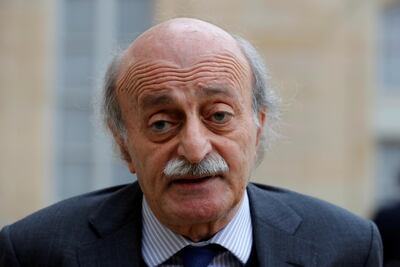Three figures from Lebanon’s civil war are proving indispensable in bringing about a fragile stability after the country recently endured one of its deepest political crises.
The three, in different ways, outmanoeuvred the vastly more powerful Hezbollah movement. They stuck to nonviolence and called what proved to be a political bluff by Hezbollah, which is backed by Iran and is allied with the Syrian regime.
It was a masterclass that only the older generation – versed in the brutal school of Lebanese politics – could deliver.
Druze politician Walid Jumblatt, Christian leader Samir Geagea and parliament speaker Nabih Berri, a Shiite, were rivals during the 1975-1990 civil war. Mr Berri is 81, Mr Jumblatt is 70 and Mr Geagea is 67.
They dislike each other but seemed intent not to breathe life into old grievances when they held their ground against Hezbollah during a recent crisis that threatened a return to communal violence and to deliver a deathblow to Lebanon’s ailing economy.
The problems started on June 30, after a shootout in the Chouf Mountains linked to a campaign by Hezbollah and its allies to unseat Mr Jumblatt. The area is the heartland of Lebanon’s small but deep-rooted Druze community, which comprises an estimated 5 per cent of the county’s 6.1 million people.
The incident quickly took a bizarre twist and was portrayed by some Hezbollah allies as an assassination attempt on Foreign Minister Gebran Bassil, who was nowhere near the scene. Hezbollah’s allies then sought to implicate Mr Jumblatt.
A victory for Hezbollah and its allies, chief among them President Michel Aoun and his son-in-law, Mr Bassil, appeared entirely possible.
In such a scenario Hezbollah would increase its domination of a country which is an economic shambles, damaging its own Shiite constituency that the movement says is the most disadvantaged sect in Lebanon.
But the three erstwhile rivals demonstrated the kind of guile that has enabled their political survival, manoeuvring Hezbollah to a stalemate and an eventual about-face.
Mr Geagea, himself the target of a 1994 show trial that cost him 11 years in prison, spoke out to warn that Hezbollah and its allies were digging up ghosts from the past.
Mr Jumblatt remained largely quiet, working his domestic and international contacts. He occasionally made brief statements, calling on all involved to act rationally but making it clear he would not be sidelined by Hezbollah.
The allegations might not have carried much significance were it not for Lebanon’s weak and divided judiciary. To stop the crisis escalating, Prime Minister Saad Hariri refrained from calling Cabinet meetings for fear they would be used to advance the possible prosecution of Mr Jumblatt.
But paralysing the Lebanese government brought risks of its own, not least of all further damage to the country’s economy.
An economic meltdown appeared to be on Mr Berri’s mind when he intervened this month to find a compromise, subtly siding with Mr Jumblatt.
Mr Berri is a long-time ally of Hezbollah and the Syrian regime of President Bashar Al Assad. Gunmen belonging to Mr Berri’s Amal Movement were sent to Beirut in 2008 to back a partial Hezbollah takeover of the capital. It was sparked by previous criticism from Mr Jumblatt of the Shiite group’s insistence on retaining its arms and its links to Iran and Syria.
Syria’s former president, Hafez Al Assad, rewarded Mr Berri for shelling Palestinian refugee camps in Beirut that were loyal to Yasser Arafat in the late 1980s by anointing him as parliamentary speaker in the political order that emerged after the war.
After the Taef agreement in 1989, Lebanon fell under the influence of the Syrian regime, which had 35,000 troops in the country until it was forced to withdraw them in 2005.
Syrian agents are nominally wanted in Lebanon for the 1977 assassination of Mr Jumblatt’s father, Kamal Jumblatt. His death forced Mr Jumblatt to ally with Hafez Al Assad or face a similar fate. Syrian troops entered Lebanon in 1976 to support Christian Maronites against an alliance of Arafat and Kamal Jumblatt.
Hafez Al Assad later helped Mr Jumblatt ethnically cleanse Maronites from parts of Mount Lebanon, as the then Syrian leader turned on the same Maronites he had helped earlier in the civil war, including militias to which Mr Geagea had belonged.
Although a master tactician, Mr Geagea played a major role in the internecine Maronite fighting within the war that hastened Syria’s domination.
Despite his ties to Damascus, this time Mr Berri was more circumspect, after the US – and, by extension, western donors – signalled their disapproval of recent events. They had pledged an $11 billion (Dh40.4bn) economic rescue package for Lebanon in 2018 but held off on delivery, in part because of the unwillingness and inability of the political class to enact reforms.
Just before the latest crisis was defused during a meeting at the presidential palace on Saturday, Mr Berri said the situation was “very dangerous”.
“There will be no investment or any economic progress without stability,” he said.
The veteran politican helped convene the meeting, which brought together Mr Jumblatt, Mr Aoun and himself, but not Hezbollah. The group, similar to its patron Iran, prefers to deal through proxies.
Hezbollah, for now, has stopped pushing its advantage as the only non-state group allowed to bear arms in Lebanon. The organisation did so only after the cost of continuing its violent tactics raised the risk of economic collapse and of the West dropping the promised aid package.
While many Lebanese have still not forgiven the three civil war-era leaders for their role in the conflict, or for staying on in positions in what remains an essentially feudal system of government, some may be happy for them to stick around for the next crisis.




